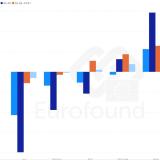
Nodarbinātība un darba tirgi
Nodarbinātība un darba tirgi ir viena no sešām galvenajām aktivitātēm Eurofound 2021.–2024. gada darba programmā. Eurofound turpinās darboties kā kompetences centrs, lai uzraudzītu un analizētu darba tirgus attīstību, jo īpaši tāpēc, ka Eiropas darba tirgi pēc Covid-19 pandēmijas saskaras ar lielām problēmām. Datu vākšanā un izpētē galvenā uzmanība tiks pievērsta pandēmijas sekām attiecībā uz darbu un nodarbinātību un tam, kā saglabāt darba tirgus darbību un iekļautību.
2021.–2024. gada laikposmā Eurofound pētījumi sniegs nozīmīgu ieskatu par izaicinājumiem un perspektīvām ES nodarbinātības un darba tirgu jomā. Eurofound ir svarīga loma darba tirgus tendenču uzraudzībā, kā arī šo tendenču ietekmes uz dažādām darba ņēmēju grupām uzraudzībā.
Pētījumos galvenā uzmanība tiks pievērsta darba tirgus mainīgajai struktūrai, izmantojot Eurofound labi izveidotos uzraudzības instrumentus, Eiropas darbavietu uzraudzības instrumentu (EDUI) un Eiropas pārstrukturēšanas uzraudzības instrumentu (EPUI), kā arī Eurostat datus. Tā kā dažās valstīs, reģionos, nozarēs un profesijās ir gaidāms augsts bezdarba līmenis, kas ietekmēs arī visdrošākos un neaizsargātākos darba ņēmējus, šie instrumenti palīdzēs noteikt augošās un sarūkošās nozares, profesijas un kvalifikāciju. ERM arī turpinās pārbaudīt liela mēroga pārstrukturēšanas pasākumus, likumdošanas un atbalsta instrumentus, kā arī pasākumus, ko izstrādājuši sociālie partneri un valsts iestādes, lai palīdzētu darba ņēmējiem pāriet no viena darba vai nozares uz citu.
Eurofound pievērsīsies arī darbaspēka trūkumam un nepietiekami izmantotajiem cilvēkresursiem un talantiem noteiktās nozarēs un profesijās, kas ir svarīgas Covid-19 laikā, izpētot politikas iesaistīšanos un uzņēmumu praksi. Īpašie temati skars prasmju neatbilstības , darba laiku , ģeogrāfisko vai profesionālo mobilitāti un ārzemnieku integrāciju , kā arī darba tirgū nepietiekami pārstāvētās grupas, piemēram, jauniešus, sievietes un personas ar invaliditāti . Eurofound aplūkos arī nozares, kuras tradicionāli skar darbaspēka trūkums, un pandēmijas dēļ šis jautājums kļūst vēl aktuālāks. Šīs aktivitātes tiks izmantotas Eiropas uzņēmumu apsekojuma (EUA) nākamā izdevuma sagatavošanas darbā.
Šajā jomā turpināsies arī Eurofound sadarbība ar Eiropas Komisijas Kopīgo pētniecības centru (KPC). Pārstrukturēšanas izpēte veicinās Eiropas Globalizācijas pielāgošanās fonda (EGF) un Eiropas Sociālā fonda+ (ESF+) darbību. Saistībā ar prasmju un darbaspēka mobilitāti nodarbinātības politikas, kuras mērķis ir novērst darbaspēka trūkumu, kontekstā tiks pētīta saikne ar radniecīgu struktūru Cedefop un Eiropas Darba iestādi.
- Infografika: Nodarbinātība un darba tirgi Eiropas Savienībā
‘“Joprojām sešiem no desmit cilvēkiem ir atvērti līgumi, kas noslēgti uz nenoteiktu laiku. Lai gan mūsu rīcībā esošie skaitļi attiecībā uz “netipisku nodarbinātību”, t.i., nepilna laika darbu un noteikta laika darbu, pēdējos piecos līdz desmit gados īpaši nav mainījušies, tie slēpj virzību uz nedrošākiem darba veidiem, un tiem, kuriem ir nedrošs līgums, nav vienādas piekļuves nodarbinātībai vai sociālajai aizsardzībai.”
Tīna Vēbere [Tina Weber], Pētniecības vadītāja, Nodarbinātības nodaļa






























